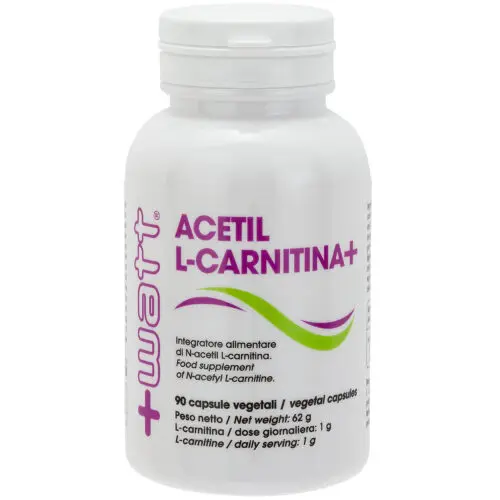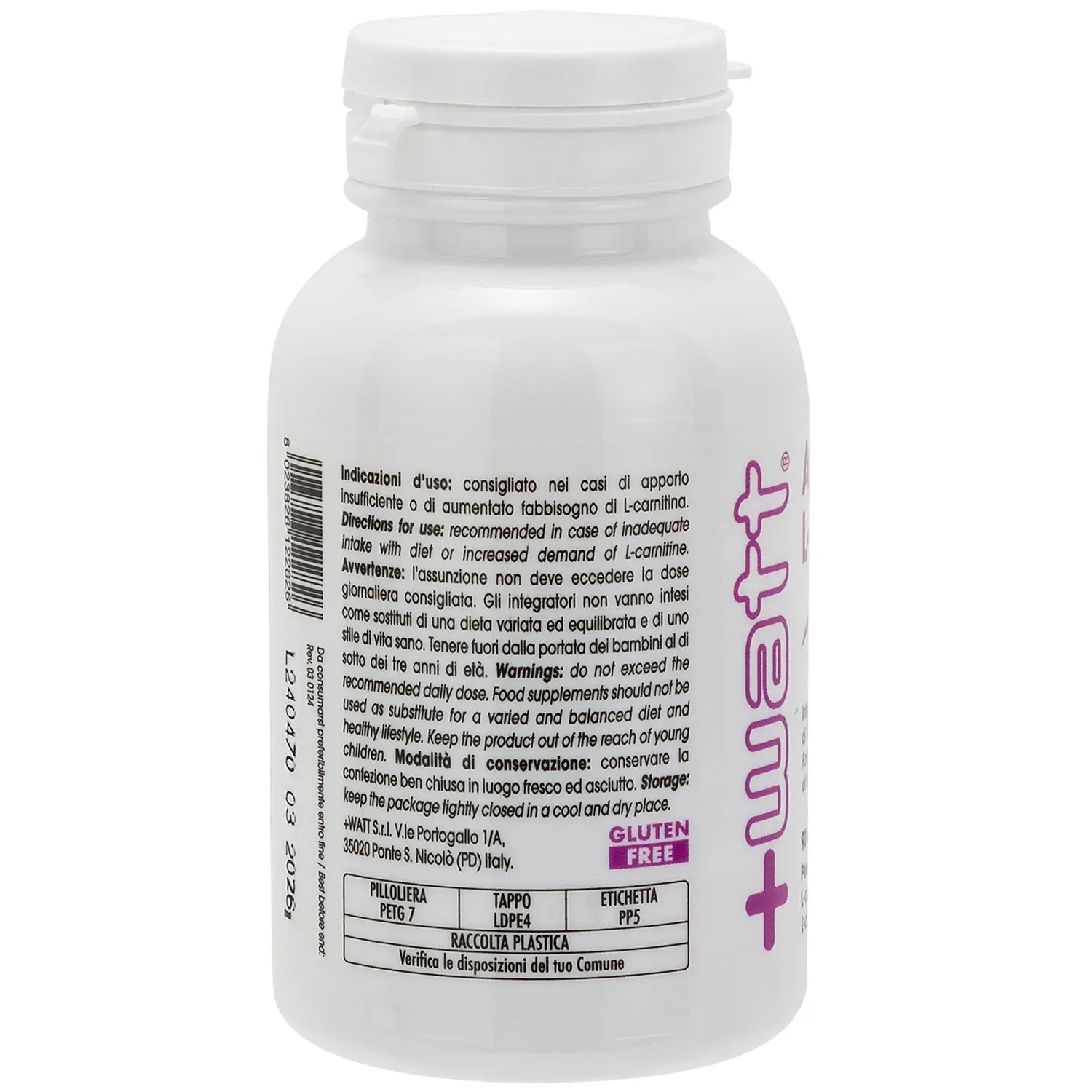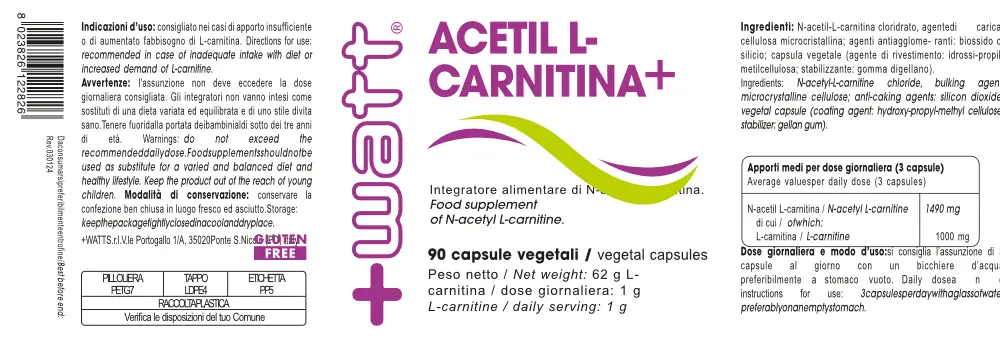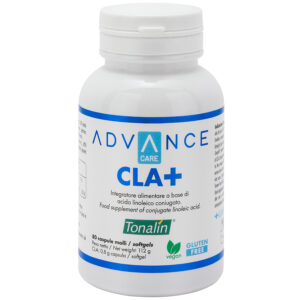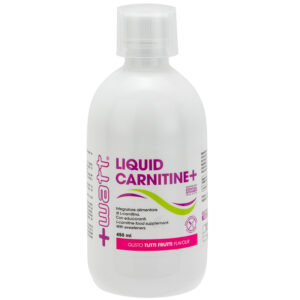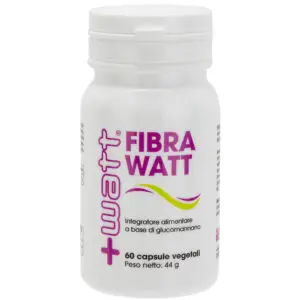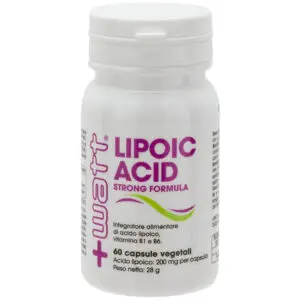Acetyl L-Carnitine+
ACETIL L-CARNITINA+ is a dietary supplement based on N-Acetyl-L-Carnitine developed to promote fat metabolism. GLUTEN FREE.
Acetyl L-Carnitine+
ACETIL L-CARNITINA+ is a dietary supplement based on N-Acetyl-L-Carnitine developed to promote fat metabolism. GLUTEN FREE.
Who is it for?
- To those who carry out endurance activities
- To those who want to lose weight
- To those who want to use fat as a source of energy
- To those with localized adiposity
What is it for?
- Reducing the perception of fatigue
- To mobilise fat mass
25,00 €
Useful for these sports:
Nutrition Info
| 1 dose = 3 capsules | |
|---|---|
| N-acetyl L-carnitine | 1,490 mg |
| of which: L-carnitine | 1,000 mg |
Description

ACETIL L-CARNITINA+ is a dietary supplement based on N-Acetyl-L-Carnitine developed to promote fat metabolism. GLUTEN FREE.
In 3 capsules of this product, there are 1.5 g of acetyl-L-carnitine, corresponding to a theoretical stoichiometric value of 1000 mg of L-carnitine.
The use of acetyl-L-carnitine instead of carnitine follows a dual motivation:
- acetyl-L-carnitine can, if needed, be converted by the body into L-carnitine and used as such;
- this substance has its own physiological effects, not attributable to the action of carnitine.
It should be noted that both carnitine and acetyl-L-carnitine are naturally present in the human body, located somewhat in all tissues with, however, a clear prevalence in skeletal muscles. The sites of endogenous production are the liver, kidneys, and brain; a part is then released into the bloodstream and transported to the remaining tissues. Part of the carnitine used by the body is introduced with the diet (about 50 mg/day). However, foods containing carnitine are only meat-based products. Vegetarian subjects will have to otherwise compensate for this dietary “deficiency” as carnitine (and therefore also acetyl-L-carnitine) is virtually absent in foods of plant origin. Oral intake of acetyl L-carnitine allows for a rapid increase in its blood levels.
The importance of carnitine as a dietary supplement derives from its main physiological function: carnitine is able to transport fatty acids into the mitochondria where they are degraded in various steps with the formation of energy. This substance is therefore indispensable in lipid catabolism (lipolysis) (Francis B.S. et al. 2013. Carnitine and fat oxidation).
Directly or indirectly from this “fat-burning” function derive other functions of carnitine:
- increase in production and availability of energy (more ATP and acetyl-CoA);
- facilitation of the oxidation of branched-chain amino acids (more energy from these substances);
- greater production of pyruvate at the expense of lactate (with the possibility of delaying the deleterious effects of this metabolite on skeletal muscle activity).
Many studies have shown that both aerobic (endurance) and anaerobic (power) effort significantly reduce blood levels of carnitine. This assumption indicates how carnitine intake can prevent deficiency states induced by physical activity of various kinds. To demonstrate carnitine’s role in lipid metabolism, there are some rare genetic diseases in which the subject is unable to produce endogenous carnitine. These deficiency forms explain the accumulation of fats at the muscle level (within muscle cells) with severe effects on the normal activity of skeletal muscle. In these cases, carnitine becomes the drug of choice, capable of alleviating the effects of such dysmetabolic states.
Numerous studies in the sports field have shown that doses ranging from a few hundred milligrams to 10 g daily, both with single and chronic administration, result in a general improvement in the athlete’s energy metabolism and an increase in performance. The most important data is that at the tested doses, carnitine has never induced harmful or unwanted side effects.
Action of Acetyl-L-carnitine: In addition to the actions of carnitine, as its precursor, acetyl-L-carnitine has its own effects. Administration of acetyl-L-carnitine improves attention, reflexes, and can be useful for counteracting neural inflammations.
Directions for use: SPORT: The product is particularly indicated for those who practice sports assiduously. The intake of Acetyl-Carnitine improves the athlete’s energy status in both power and endurance efforts. What can be important in both types of effort is the product intake scheme (see doses) to reduce the formation of lactic acid.
Doses: For power effort, take a relatively high dose of the product (6-9 capsules) before training or competition. In endurance sports, it is advisable to take a smaller dose (3-6 capsules per day) but prolonged over time (several months).
DAILY LIFE: The product is indicated in cases of asthenia, muscle weakness. Useful for supplementing diets with total or partial absence of meat products (vegetarian). Indicated for children and the elderly, where meat consumption may be inadequate.
Doses: 3 capsules per day.
Warnings: Do not exceed the recommended daily dose. Supplements should not be considered as a substitute for a varied and balanced diet and a healthy lifestyle. Keep out of reach of children under three years of age.
Packaging: 90 vegetable capsules
Ingredients
Item images displayed on this site may not reflect the actual appearance of the product due to recent labeling updates.
For correct information, please always consult the label of the product received.
The information present is to be considered simple indications and is not intended, under any circumstances, to replace medical advice. It is always advisable to contact your doctor or a qualified nutritionist to ensure a balanced and healthy diet.
EAN: 8023826122826
